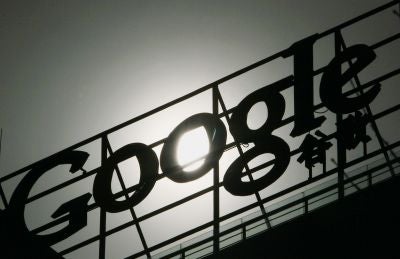Your support helps us to tell the story
From reproductive rights to climate change to Big Tech, The Independent is on the ground when the story is developing. Whether it's investigating the financials of Elon Musk's pro-Trump PAC or producing our latest documentary, 'The A Word', which shines a light on the American women fighting for reproductive rights, we know how important it is to parse out the facts from the messaging.
At such a critical moment in US history, we need reporters on the ground. Your donation allows us to keep sending journalists to speak to both sides of the story.
The Independent is trusted by Americans across the entire political spectrum. And unlike many other quality news outlets, we choose not to lock Americans out of our reporting and analysis with paywalls. We believe quality journalism should be available to everyone, paid for by those who can afford it.
Your support makes all the difference.Google missed Wall Street's quarterly profit estimates for the first time in two years after a spike in expenses offset a 24 per cent revenue jump, but it vowed to keep investing in new businesses to drive long-term growth.
Shares of the Internet search engine leader fell almost 4 per cent on worries about rising costs as it spent heavily on research and development and hired aggressively to expand into new products and markets in hopes of maintaining the growth momentum Wall Street looks for.
Google eased worries that lingering economic uncertainty from the European debt crisis could take a toll on its business, and stressed that it planned to continue to aggressively invest in new growth opportunities.
"They're throwing more money into R&D than people were expecting and a little bit less into sales and marketing," said BGC Partners analyst Colin Gillis. "Google has been pretty clear that it's going back into investment mode. They added 1,200 people in the quarter, which means more expenses are going to kick in September."
Google said the spending was concentrated on a handful of initiatives it believes could grow into billion-dollar businesses, providing diversification from the search advertising that now accounts for the lion's share of revenue.
Finance Chief Patrick Pichette cited Internet display advertising and the nascent smartphone advertising market as some of the key areas for investment, and defended the spending amid the economic uncertainty.
"It's while everybody is cautious that you need to pounce," Pichette said in an interview with Reuters on Thursday.
Pichette added that Google, which generated 52 per cent of its second-quarter revenue outside the United States, has not suffered any ill effects amid as investors fear that an economic slowdown could crimp advertising spending.
Some analysts said headwinds from weakening foreign currency - in particular the embattled euro - did not hurt revenue growth as much as anticipated. According to its statement, second-quarter revenue would have been $176 million (£114 million) if forex rates had remained constant from the first quarter.
"In our results and in our business we have seen no impact of the current turmoil of the economic environment," said Pichette.
Thursday's results were a rare outright earnings miss - Google's first since the second quarter of 2008.
The world's No. 1 search engine posted net income of $1.84 billion (£1.2 billion), or $5.71 a share, in the second quarter - up from $1.48 billion (£962 million), or $4.66 a share, in the year-earlier period.
Excluding items, Google's EPS was $6.45, below the average estimate of $6.52, according to Thomson Reuters I/B/E/S.
The company has made a number of major strategy shifts this year, including the decision to stop censoring search results in China - a move analysts say has contributed to the more than 20 percent decline in Google's stock this year.
While it announced last week that its license to operate a website in China was renewed for a year, Google did not address that during Thursday's earnings call other than to say that revenue from the country in the second quarter was "decent" but remained immaterial to the company.
More immediately, Google is increasingly pitting itself against rivals beyond Yahoo and Microsoft, as it ventures into smartphone operating systems, mobile advertising and other areas in search of future growth.
Executives highlighted a three-fold jump in searches made on phones running Google's Android operating system as a sign of the platform's growing market traction.
To compete with the likes of Apple, Google made a string of acquisitions in recent months and added 1,184 employees to its payroll during the second quarter for a total of 21,805.
That spending spree contributed to a 22 per cent year-on-year jump in operating expenses in the second quarter and took a toll on the bottom line, according to analysts.
"The question is going to be, how much money are they going to have to be putting in for new initiatives?" asked UBS analyst Brian Pitz.
Net revenue, which excludes costs that Google shares with website partners, was $5.09 billion (£3.3 billion), above the $4.98 billion expected by analysts polled by Thomson Reuters I/B/E/S.
Shares in Google fell to $474.50 after closing at $494.02 on Nasdaq.
Some analysts highlighted strong 24 per cent growth in revenue as signs that Google was weathering well a difficult economic and advertising environment.
"I was pleased with the revenue coming ahead of expectations, driven by the strength in the U.S.," said Richard Fetyko of Merriman Curhan Ford. "Even with the forex headwinds from international, they came in $100 million (£65 million) ahead of expectations."

Join our commenting forum
Join thought-provoking conversations, follow other Independent readers and see their replies
Comments